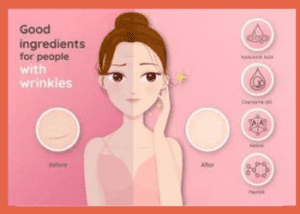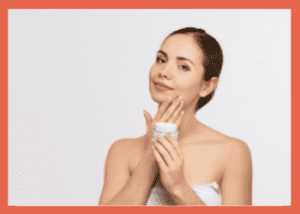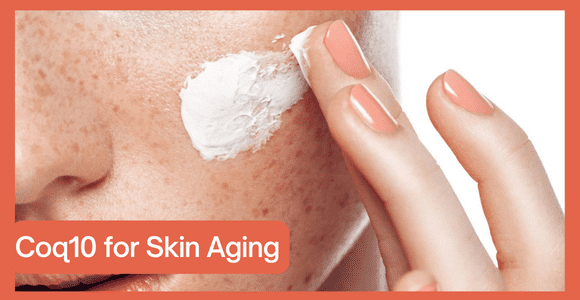CoQ10, otherwise known as ubiquinone, is a vital part of the human body. Found in its mitochondria – energy-producing structures within cells – CoQ10 helps transfer electrons to create ATP (energy) and is necessary for many different organs and systems such as the heart and muscles.
Without CoQ10 our bodies simply wouldn’t be able to function optimally! CoQ10 is found in small amounts in a variety of foods including vegan, including oily fish (such as salmon, mackerel, and sardines), organ meats (such as liver and heart), nuts and seeds, and whole grains. As age progresses, CoQ10 production within the body begins to diminish. This can lead to a host of health issues including heart disease and neurodegenerative diseases as well as prematurely reduce the signs of ageing skin. To combat this, replenishing our levels of CoQ10 is essential for optimal health and well-being.
Effects on skin aging:
- As we age, the CoQ10 levels in our skin begin to deplete, resulting in a lack of energy production and an increase in oxidative stress;
- Fortunately, topical application of CoQ10 has been proven beneficial for your complexion- acting as an antioxidant to protect it from free radicals damage;
- Stimulating collagen synthesis which can restore elasticity;
- Diminishing wrinkles and fine lines while enhancing its health overall.
- CoQ10 protects your skin cells against free radicals and oxidative stress from elements like the sun damage and pollution
- The potent antioxidant function of CoQ10 helps it to protect the skin at the molecular level from the damaging effects
Table of Contents
How CoQ10 Benefits the Skin
Utilizing the extraordinary antioxidant properties of CoQ10, you can protect your skin from free radicals and their adverse effects. Free radicals are known to cause fine lines, wrinkles, age spots, and more due to cell deterioration.
 Antioxidants work by neutralizing these unstable molecules so they cannot wreak further harm upon your body’s largest organ – the skin! CoQ10’s antioxidant potency owes to its capacity for both accepting and donating electrons, thereby helping it neutralize free radicals. Moreover, CoQ-10 can enhance the formation of other antioxidants that defend our skin from harm.
Antioxidants work by neutralizing these unstable molecules so they cannot wreak further harm upon your body’s largest organ – the skin! CoQ10’s antioxidant potency owes to its capacity for both accepting and donating electrons, thereby helping it neutralize free radicals. Moreover, CoQ-10 can enhance the formation of other antioxidants that defend our skin from harm.
For instance, glutathione is one such robust protector against oxidative stress which CoQ-10 helps generate. Applying CoQ10 topically has been demonstrated to furnish substantial safeguards against UV-induced damage due to its capacity of neutralizing free radicals.
Not only that, but it can also magnify the appearance of skin afflicted by photoaging by stimulating collagen production and intensifying skin elasticity – a telltale sign of a youthful complexion. While CoQ10’s antioxidant strength may not be as intense as other antioxidants like Vitamin C, it is still a beneficial addition to your skincare routine in order to guard the skin against everyday environmental harm.
How CoQ10 can boost collagen production and improve skin elasticity
Studies have shown that CoQ10 can be a significant contributor to enhancing collagen production and improving the skin’s suppleness. Collagen, as you may know, is an integral part of our skin because it gives us strength and elasticity – yet unfortunately with age comes decreased collagen levels which then consequently leads to wrinkles and sagging skin. By taking CoQ10 we can support replenishing in the body what has been lost over time due to aging.
An investigation conducted on a group of women aged 40-60 demonstrated that through topical application, CoQ10 can enhance the generation of collagen and ultimately increase skin elasticity while diminishing wrinkles. The participants applied the CoQ-10 cream to one side of their face for 12 weeks consecutively with no treatment given to the other side. Results revealed a remarkable difference between both sides; the section treated with CoQ10 exhibited considerable improvement in terms of elasticity compared to its untreated counterpart.
Furthermore, research has demonstrated that CoQ10 applied topically also provides photoprotection, which minimizes the effects of photoaging (such as wrinkles, fine lines, and age spots) caused by UV radiation from the sun.
It is important to note that the research conducted typically combines CoQ10 with other elements for optimal efficiency. Due to its limited absorption rate, experiments are often completed using high concentrations which may not be accessible in conventional topical items. Therefore, it is strongly recommended that you consult a dermatologist prior to trying any new product on your skin.
Can a CoQ10 Supplement Renew Your Skin?
While there is some evidence that taking CoQ10 supplements may benefit skin health, the data are inconclusive and more research needs to be conducted to understand its effects fully.
Here’s an overview of the potential advantages and drawbacks of using a CoQ10 supplement for your complexion:
| Benefits | Limitations |
|---|---|
| Boosts collagen production | Absorption may be limited |
| Improves skin elasticity | Studies have used high concentrations of CoQ10 |
| Has antioxidant properties | More research is needed |
| Could reduce photoaging effects | Absorption might be limited |
Even though CoQ10 supplements can be beneficial, they should never replace a healthy diet or lifestyle. Applying the supplement topically is more effective for skin health since larger doses can be directly delivered to the skin. Before beginning any new supplement regimen, it’s important to speak with a healthcare professional first.
How to Use CoQ10 for Skin
COQ10 is a natural nutrient that functions as an energizer in the body – and you can take it in supplemental forms, including cream, serum, or oil. If you are looking to improve the appearance of your skin, topical creams and serums that contain CoQ10 can be an effective solution.
These products often promise anti-aging or skin-brightening properties but bear in mind that concentrations may differ significantly. To ensure optimal results, read product labels carefully and select one with a sufficient quantity of this potent nutrient!
 CoQ10, when combined with other carrier oils to improve its penetration and absorption rate, can often be found in topical oil formulations.
CoQ10, when combined with other carrier oils to improve its penetration and absorption rate, can often be found in topical oil formulations.
To achieve optimal results from any topical CoQ10 product, be sure to adhere strictly to the directions for use and make a point of using it regularly. Additionally, prior to applying it on wider areas of your skin, conduct a patch test first in order to check if you have an allergic reaction.
When trying out a new facial product, it’s always best to get advice from a dermatologist. That way you can be sure that the products are tailored to your skin type and address any underlying issues you may have. A professional will help you make an informed decision about what skincare works best for your unique situation.
To get the most out of your CoQ10 product, it is crucial to select one with a higher concentration that lacks any potentially harmful ingredients and use it regularly according to the instructions. Doing so will help ensure optimal results!
Get the most out of your skincare routine with these simple tips for using CoQ10:
- To ensure that no adverse effects will occur, begin with a low-potency product and experiment on an inconspicuous area of your skin.
- Monitor the results carefully to be certain you have no counteractive reactions.
- Enhance your energy and vitality by taking CoQ10 twice a day, once in the morning and again at night.
- After washing your face, reach for this product and apply it before you moisturize.
- Massage the product into your skin in soft, circular motions – taking care to not come near your eyes.
- Take advantage of the product twice daily, in accordance with instructions.
- Couple with other antioxidants like Vitamin C to maximize their potency.
- Safeguard your skin with sunscreen after every application of CoQ10 to prevent any potential damage.
- Remain consistent and be persistent. It might take several weeks, or even a few months to observe visible results on your skin.
Keep in mind that the potency of topical CoQ10 may be impacted by a number of factors, including your skincare regime, diet and exposure to environmental stressors.
It is advantageous to have an extensive skincare routine and lead a healthy lifestyle for optimal results. You can also consult with a dermatologist or skin care specialist for advice regarding personalized treatment plans; this would be highly recommended!
How Much CoQ10 Should I Take for Wrinkles?
The recommended dosage of CoQ10 for addressing wrinkles and promoting skin health is not firmly established due to the limited scientific consensus and research in this specific context. CoQ10, or coenzyme Q10, is primarily known for its role in cellular energy production and antioxidant defense. While it’s believed to have potential benefits for skin health, including reducing oxidative stress and promoting collagen production, the optimal dosage for wrinkle reduction remains an area of ongoing study and debate.
Dosages of CoQ10 can vary based on factors such as age, health status, and individual response. In some topical skincare products, CoQ10 is included as an ingredient to potentially support skin health. As for oral supplementation, typical doses for general health range from 100 to 300 milligrams per day.
However, it’s important to note that the efficacy of CoQ-10 for wrinkle reduction might not solely depend on dosage. Factors such as the formulation, absorption, and interactions with other compounds play a role in its potential benefits. Furthermore, individual responses to supplements can vary widely.
Before considering CoQ10 supplementation for wrinkle reduction, it’s advisable to consult a dermatologist or healthcare professional. They can provide personalized recommendations based on your skin type, existing skincare regimen, and overall health, helping you make informed decisions about incorporating CoQ10 into your skincare routine.
Does Q10 Make You Look Younger?
The potential and benefits of COQ10, to make you look younger is a subject of scientific interest and ongoing research. CoQ10 is known for its role in cellular energy production and antioxidant defense, which are processes that play a crucial role in maintaining healthy skin. While CoQ10’s antioxidant properties may help counteract oxidative stress and contribute to skin health, the direct impact of CoQ-10 on making you look younger is complex and multifaceted.
CoQ10’s presence in skin cells can decline with age, potentially affecting skin health and contributing to the aging process. Some studies suggest that topical application of CoQ-10 may help reduce the appearance of wrinkles and improve skin texture by supporting collagen production and protecting against UV-induced damage.
However, the effectiveness of CoQ10 in making you look younger can vary based on factors such as formulation, concentration, skin type, and individual response. Additionally, it’s important to note that while CoQ-10 may have positive effects, it is not a magic solution and should be part of a comprehensive skincare routine that includes sun protection, proper hydration, and a healthy lifestyle.
Before incorporating CoQ10-based skincare products into your routine, it’s advisable to consult a dermatologist. They can provide personalized advice based on your skin’s specific needs and help you make informed decisions about skincare strategies to support a youthful appearance.
Conclusion
To sum up, CoQ10 is an essential coenzyme in the energy production process inside cells. CoQ10 is believed to have the potential to affect estrogen levels in the body, as some studies have shown that it may act as a weak estrogen agonist and stimulate the growth of estrogen-sensitive cells, although more research is needed in this area. As we grow older, CoQ-10 levels within our bodies diminish and this can lead to lower energy creation and greater oxidative pressure.
CoQ10 applied topically offers a multitude of advantages for the skin, such as warding off harm brought about by free radicals, augmenting collagen production to bring back suppleness and firmness to aging skin, lessening wrinkles and other fine lines, and rejuvenating your complexion.
Oral CoQ-10 supplementation may have promising effects on the skin, yet further research is essential to unlocking its full potential. To give your delicate complexion the best chance of reaping CoQ10’s beneficial properties, try incorporating it into your daily skincare routine with creams, serums, or oils.
It is essential to use a CoQ-10 product with the correct concentration and form when introducing it into your skincare routine, plus maintain consistency in its use. This should be done alongside a well-rounded skincare routine and healthy lifestyle for maximum benefits.
For anyone wishing to delve deeper into the research on CoQ10 and its contribution to skin health, consider consulting with well-respected sources such as the National Institutes of Health, The Journal of Clinical and Aesthetic Dermatology, or even The International Journal of Molecular Sciences.
Other references for further reading about CoQ10 and its potential benefits for skin aging include:
- The International Journal of Dermatology: This peer-reviewed journal publishes articles on the latest research and developments in the field of dermatology, including studies on the use of CoQ10 for skin health.
- Dermato-Endocrinology: This journal covers scientific research in the field of dermal and endocrine interactions, where they publish studies on the effect of CoQ10 on the skin and its anti-aging properties.
- The Journal of Biomedical Research: this journal explores various topics in biomedicine, including some studies on the antioxidant and anti-aging effects of CoQ10 on the skin.
- PubMed: this is a free database provided by the National Library of Medicine, which contains over 30 million citations for biomedical literature, including many articles on the use of CoQ10 for skin health and aging.(https://pubmed.ncbi.nlm.nih.gov/19096122)
Also, consulting professional societies such as the American Academy of Dermatology and the International Coenzyme Q10 Association may be useful for more detailed and accurate information.
